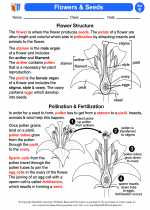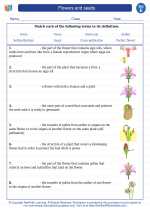Flowers and seeds -> multicellular
Multicellular Organisms
A multicellular organism is an organism that is composed of more than one cell. These cells work together to perform various functions and carry out the processes necessary for the organism's survival.
Characteristics of Multicellular Organisms:
- Cellular Differentiation: Multicellular organisms have specialized cells that are organized into tissues, organs, and organ systems to carry out specific functions.
- Cellular Communication: Cells in multicellular organisms communicate with each other through chemical signals to coordinate their activities and maintain homeostasis.
- Growth and Development: Multicellular organisms undergo growth and development through cell division, differentiation, and maturation.
- Reproduction: Most multicellular organisms reproduce sexually, with specialized cells (gametes) fusing to form a zygote, which develops into a new multicellular organism.
- Complexity: Multicellular organisms exhibit a higher level of complexity compared to unicellular organisms, with specialized structures and systems for carrying out various functions.
Examples of Multicellular Organisms:
Some examples of multicellular organisms include:
- Humans
- Animals (e.g., dogs, cats, elephants)
- Plants (e.g., trees, flowers)
- Fungi (e.g., mushrooms, molds)
Study Guide:
When studying the topic of multicellular organisms, it's important to focus on the following key points:
- Understanding the difference between unicellular and multicellular organisms.
- Exploring the structure and function of specialized cells, tissues, organs, and organ systems in multicellular organisms.
- Investigating the role of cellular communication and coordination in multicellular organisms.
- Examining the processes of growth, development, and reproduction in multicellular organisms.
- Comparing the complexity and organization of multicellular organisms with unicellular organisms.
By mastering these concepts, you'll gain a solid understanding of multicellular organisms and their significance in the natural world.
.◂Science Worksheets and Study Guides Fifth Grade. Flowers and seeds
Study Guide Flowers and seeds
Flowers and seeds  Activity Lesson
Activity Lesson Flowers & Seeds
Flowers & Seeds  Worksheet/Answer key
Worksheet/Answer key Flowers and seeds
Flowers and seeds  Worksheet/Answer key
Worksheet/Answer key Flowers and seeds
Flowers and seeds  Worksheet/Answer key
Worksheet/Answer key Flowers and seeds
Flowers and seeds  Worksheet/Answer key
Worksheet/Answer key Flowers and seeds
Flowers and seeds  Vocabulary/Answer key
Vocabulary/Answer key Flowers and seeds
Flowers and seeds  Vocabulary/Answer key
Vocabulary/Answer key Flowers and seeds
Flowers and seeds 

 Activity Lesson
Activity Lesson
 Worksheet/Answer key
Worksheet/Answer key
 Worksheet/Answer key
Worksheet/Answer key
 Worksheet/Answer key
Worksheet/Answer key
 Worksheet/Answer key
Worksheet/Answer key
 Vocabulary/Answer key
Vocabulary/Answer key
 Vocabulary/Answer key
Vocabulary/Answer key

The resources above cover the following skills:
Life Science
All organisms have structures and systems with separate functions. Students can:
Develop and communicate an evidence-based scientific explanation of the role of different organs or structures that are important for an organism's survival - in both plants and animals